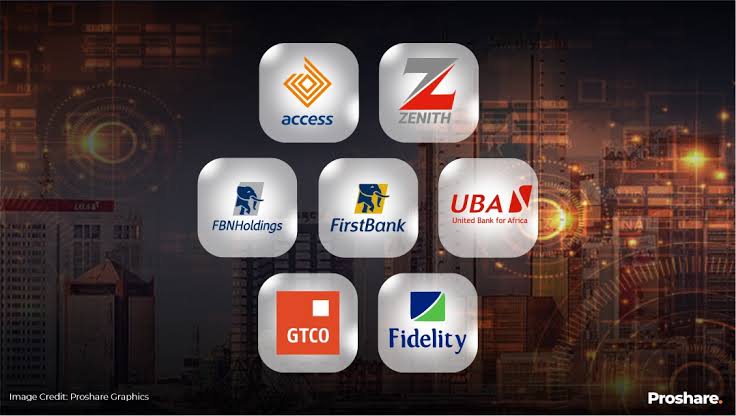767
Daniel Adaji
Seven major Nigerian banks are likely to benefit from a potential upgrade of Nigeria’s sovereign Long-Term Issuer Default Ratings (LT IDRs), according to Fitch Ratings.
According to the information obtained from the agency on Friday, the positive outlook on the sovereign’s ‘B-/Positive’ rating reflects a similar outlook for these banks, which include Access Bank, Zenith Bank, First HoldCo, First Bank of Nigeria, United Bank for Africa (UBA), Guaranty Trust Holding Company (GTCO), and Guaranty Trust Bank (GTB).
Fitch suggested that these upgrades are contingent on Nigeria maintaining a stable financial environment and the banks continuing to show financial resilience.
“Seven Nigerian bank and two bank holding company Long-Term Issuer Default Ratings (LT IDRs) would be likely to be upgraded if Nigeria’s sovereign LT IDRs (B-/Positive) were upgraded and the entities maintained stable financial profiles,” Fitch stated.
The ratings for these banks, except for Bank of Industry (BOI), are primarily driven by their standalone creditworthiness, expressed through Viability Ratings (VRs).
However, these VRs have been constrained by the banks’ substantial exposure to the sovereign, particularly through holdings of sovereign debt securities and large cash reserves at the Central Bank of Nigeria.
“The VRs are primarily constrained by high exposure to the sovereign through holdings of sovereign debt securities and large cash reserves at the Central Bank of Nigeria,” Fitch explained in the report.
Notably, the VRs of Zenith, UBA, and GTCO/GTB are one notch below the ‘b’ implied VRs due to constraints imposed by the operating environment and sovereign rating, which may improve should Nigeria’s LT IDRs be upgraded.
Fidelity Bank, despite having a smaller franchise than other major Nigerian banks, is actively working on raising capital to meet the increased minimum paid-in capital requirements set to take effect at the end of Q1 2026. The bank has already doubled its paid-in capital since the end of Q3 2024.
“The improvement in core capitalisation would support an upgrade of Fidelity’s VR and LT IDR if the sovereign were upgraded,” Fitch stated.
For BOI, a state-owned policy bank, the LT IDR is driven by a limited probability of government support, reflected in its Government Support Rating of ‘b-’. Fitch notes that an upgrade of the sovereign rating would enhance the government’s ability to provide support, likely leading to a corresponding upgrade for BOI.
On the other hand, banks such as First City Monument Bank, Wema Bank, Jaiz Bank, and Coronation Merchant Bank have ‘B-’ LT IDRs, which are constrained by a weaker financial profile and the domestic operating environment.
A positive reassessment of the operating environment, which could result from a sovereign upgrade, would also improve these banks’ ratings.
“Without a sovereign upgrade, the ratings would remain capped at the level of the operating environment score,” Fitch added, highlighting the close link between the country’s overall economic outlook and the performance of the financial sector.
In the context of these potential upgrades, the report also emphasizes the continued risk of macroeconomic instability, which has led to various interventions by Nigerian authorities, including a high cash reserve ratio requirement and a minimum loans-to-deposits ratio of 50 per cent.
These measures are designed to stimulate credit extension despite the challenging macroeconomic conditions.
Fitch noted that Ecobank Nigeria and Union Bank of Nigeria, which currently have ‘CCC’ LT IDRs, would require restored capital adequacy compliance and sufficient buffers to absorb potential future losses to see an upgrade. Their ratings are also closely linked to the financial health of their parent institutions.
Fitch added that “an upgrade of their VRs and IDRs would require restored capital adequacy ratio compliance with sufficient buffers to absorb the impact of potential further local-currency depreciation and credit losses and to mitigate credit concentration risks.”
As the Nigerian government continues its efforts to stabilize the economy, the outlook for these banks remains closely tied to the sovereign rating, with an upgrade holding the potential for significant benefits for the country’s major financial institutions.



